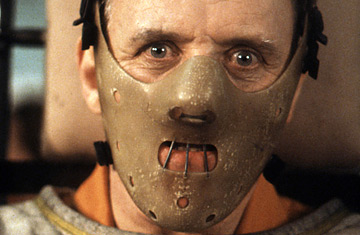
Sir Anthony Hopkins in "Silence of the Lambs"
(2 of 4)
HANNIBAL DEFECTORS
Critics had their own knives out when Hannibal Rising was published last week. They panned it with vigor and a near-unanimous weakness for cannibal puns. ("An indigestible back story!" "Toothless prequel!" "Hard to swallow!") Of the reviewers I've read, only Malcolm Jones over at Newsweek found some favor with the book, saying he preferred it to Silence, of which he "was never a huge fan," and ranking it second in the tetralogy to Red Dragon.
I'd rate it fourth out of four. But then I think the first three books are, in order, great (Red Dragon), merely terrific (Silence) and epically creepy (Hannibal). The writing in the new one tends to flab compared to the leanness of the earlier books. And there's a bigger problem I'll get to in a minute. For now, call Hannibal Rising an OK book from a superior writer. You'll want to get it, not just to read, and decide for yourself, but to place next to the other Lecters. It has family resemblances: a keen intelligence, a crime-heat reporter's attention to morbid detail and a fearless interest in abnormal psychology. But if the four books in the series were the Marx Brothers, this one would be Zeppo — a supporting actor outplayed by the charismatic stars.
Originally, Hannibal was a supporting character, too. The first two books have more or less the same plot. In Red Dragon, FBI profiler Will Graham, the man who caught and imprisoned Lecter, accepts his intercession and interference as a possible aid in finding a serial killer nicknamed the Tooth Fairy (because he leaves bite marks on his corpses). In The Silence of the Lambs, FBI agent Clarice Starling is tracking Buffalo Bill, and again Lecter played the brilliant, deranged, unreliable consigliere.
But Hannibal was one of those supporting players, like Falstaff in Henry IV, whose extravagant personality propels them into the limelight. The trick to the Lecter character was genius uncorrupted by conscience. Inside him, polar opposites coexisted: elegance and heartlessness, fastidiousness and cruelty, insanity and insight. He's a great people-reader, exercising a hypnotic power over those he meets, and with an acute instinct for the emotional jugular. This is on display the first time Hannibal appears in the books — when Will Graham visits him in a prison cell in Red Dragon — "Graham felt that Lecter was looking through to the back of his skull. His attention felt like a fly walking around in there."
In popular culture, style trumps substance, and the mass murderer became a fashion plate, and the inspiration for dozens of upmarket killers in novels and films. Harris promoted Hannibal to leading player in the 1999 book, and has now done him the courtesy of a prequel: his life to the year 18.
